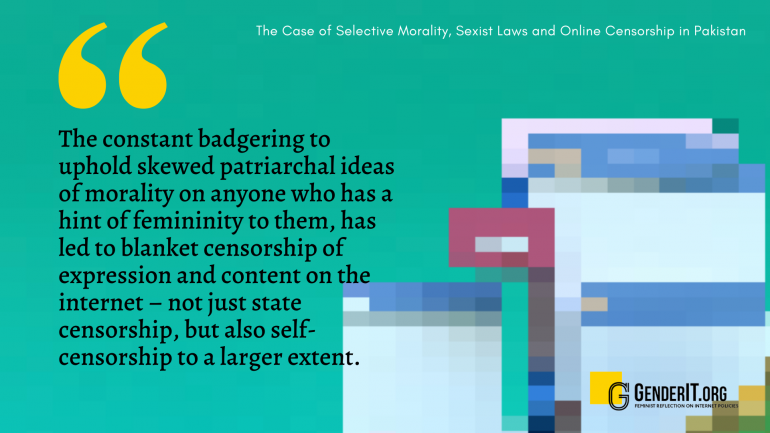
Maria Furqan is a content creator from Karachi who posts fashion videos on her Instagram account with a following of over 70,000. Ranging from her workout sessions recorded in her gym, to paid promotions and brand endorsements, to dance videos that she makes from a corner in her bedroom, Maria does not adhere to the typical idea of morality as dictated by the Pakistani society in the way she dresses and acts on her public profile. But that is also why she has been a subject of a lot of moral policing and unwanted scrutiny of her body and clothing in her content, but nothing budges her now. “I never gave a stranger on the internet the power to silence me,” she says.
The mere idea of not letting others’ opinion affect her is considered an act of rebellion according to the Pakistani society’s standards of morality, but Maria looks at it as her way of taking control of her life and the choices she makes for herself. The comments that she receives on her videos are often hateful that target or criticise her personhood, but because she has not let it change her, most of the times the comments are positive and directed towards her content rather than the way she dresses or what she does in the videos.
The larger population of Pakistan has an obsession with forcing their own ideas of morality on others, but more so on women and even on girls as young as 2 years old. Many conservative and semi-conservative families cover their toddlers in chadar or a headscarf to ‘instil the habit of purdah in them from a young age.’ This obsession is not just based on Islamic principles of purdah, but has over time become more a part of the cultural norm based on patriarchal control of women’s bodies, their choices and, in extension, their lives. It dictates what they are allowed to wear, where they are allowed to go, who they are allowed to go or seen in public with, what suitable profession there is that they can adopt, down to who they are going to marry and how. Morality, and honour of the family and the entire society, has intrinsically been linked with women’s bodies, more particularly in their vaginas and who gets its access. As a result, women are killed in the name of honour, they are grounds of revenge for rival men and their tribes, and their existence is invisibilized throughout their lives.
The obsession with honour and upholding morality has impacted the way the country is ruled and governed. The beliefs rooted in patriarchal ideologies that have long dictated many governing processes that should have remained unbiased, have found their way into law making through those who enforce said ideologies in regular lives. It is imperative to acknowledge that people making laws are the same individuals who have upheld and enforced patriarchal and conservative notions for generations, who look at women as objects that must be hidden behind closed doors and under 3 yards of chaadar (plain cloth used to wrap around women’s bodies). Exhibit A: Maulana Tariq Jameel, a renowned and well-respected religious scholar with a lot of influence in Muslim communities around the world, has time and again objectified women and portrayed them as objects for men’s pleasures in his many sermons. He also emphasises that while women in heaven, referred to as hoor, will solely be present for men’s sexual desires, women in this world must be hidden from everyone’s eye but the eyes of the man who owns her – her husband; further attaching men’s honour with women’s bodies. And while he is not a lawmaker or a government official, his following includes many who are, and the views presented by him resonate with and validate the views of many men who listen to and follow him, offline and online.
This influence, not just of Jameel’s but also of many like him, then impacts how laws are made and the country is governed. The effects of this influence have been seen not just in people’s personal lives within their homes, but also on a larger scale through censorship in the media – both mainstream entertainment media and online media.
Censorship of Women’s Expression
Pakistan’s relationship with media censorship is long and one that has seen many changes over the years, but what has remained consistent is the fact that it focuses on policing women’s presence on the screens: how they are portrayed, what they wear, how they talk, the kind of relationship they maintain with men on screen with them and what this says about them. The scrutiny goes deep into their personal lives where they are attacked and character assassinated for their choices outside of their work or the way they portray themselves on the internet. As a result, increased censorship of these mediums is prevalent across all platforms, but more so on social media.
With the passage of the Prevention of Electronic Crimes Act (PECA) 2016, commonly known as the cybercrime law, this censorship has been legitimised by giving blanket control to the regulator Pakistan Telecommunication Authority (PTA) over “morality” on the internet. Section 37 of the law gives PTA the powers to censor the internet, which the regulator has already exercised liberally in the past six years, as evident by the banning of a plethora of websites and applications in the name of morality and obscenity. The recent targets of this law include dating apps like Tinder and Grindr, video streaming application Bigo Live, and short video sharing application TikTok that has gone through four bans between October 2020 and July 2021, for failing to “fully comply with the instructions” of the regulators to remove “immoral”, “indecent” and “unlawful online content”.
The terms “immoral” and “indecent” have been taken from colonial-era Penal Code of 1860 which is still in effect in Pakistan, and these words have been included in other legislation like PECA, ultimately applied per their vague definitions, mostly on women’s expressions on the internet. The constant badgering to uphold skewed patriarchal ideas of morality on anyone who has a hint of femininity to them, has led to blanket censorship of expression and content on the internet – not just state censorship, but also self-censorship to a larger extent.
Maria Furqan, the content creator on Instagram, says, “There did come a point where I started to self-censor on the internet because of the pressure from my then-partner who said his family would not approve of me if I continued to share my content, but then I realised I’m not going to change myself for someone because that’s not being authentic.” Maria’s response is unlike most Pakistani women on the internet, and she attributes her attitude to her upbringing where she was not policed by her family for the choice of her clothes or beliefs. However, the hateful comments from strangers on the internet are constant. “I do get a lot of hate online for the kind of pictures I put up, or the kind of clothes I wear or the kind of poses I do, but I still do it because that’s my space, that’s how I express myself.” Maria says that the entire point of her public Instagram account is sharing content that resonates with her, and “not to please someone else.”
But Maria’s journey as a content creator was not always like this. She has deleted a lot of her content in the early days of her blog, “I used to delete a lot of my content because I would get a lot of hate with comments calling me a randi (whore) and would slut shame me. Sometimes people would also go on to attack my family.” These comments were mostly being sent to her by misogynistic men, and she would delete these comments and the content that would receive hate, but over time she changed her response to this engagement and started to block people instead of self-censoring. “At this stage I’m more comfortable with who I am as compared to three years ago when I started my blog,” she says.
“Morality”, in all its meanings, is very different for everyone. Usama Khilji, a digital rights activist from Islamabad, says that morality is a “a strictly subjective concept,” and adds, “The state should not act paternalistically and decide for citizens what is moral and what is immoral.” He points out that people’s morality varies through a range of different things, and asks, “Whose morality is the state [of Pakistan] really trying to impose?"

The subjective nature of this term dictates that morality cannot be accurately and precisely defined, for what constitutes moral for me may not align with the idea of morality for the person next to me. For instance, while it is ok for me to wear a sleeveless shirt, most of the people around me believe that it negates their standards of morality. So to expect that the state and a law can define this term so the implementation can be precise may not be a good idea as those drafting laws also more often than not consider women as the flag bearers of honour of men associated with them, their families and of societies at large. This can be further exhibited in how women’s clothing is blamed for natural disasters by clerics and those who blindly follow them. It takes a comical turn when the lines between fiction and real life become blurred for men who expect actresses playing their favourite fictional characters to adhere to their moral standards in their real lives.
An example of this is that of a Turkish actress Esra Bilgic who played a beloved character of Halime Hatun in the Turkish show dubbed in Urdu for Pakistani audience, Ertugrul. Pakistani men did not approve that the actress behind the character portrayed as the ‘pious’ wife of the protagonist of the show, is a real person with real personal life and choices outside of the show. The expectation of Pakistani men that Bilgic would maintain the same lifestyle as she does in the show, and would wear modest clothes that align with Pakistani ideals of morality, was shattered when they got access to Bilgic’s Instagram profile. Her choice of wearing a crop top, a dress with low back, shorts and anything that showed her skin receive comments from disgruntled men preaching her Islam, and why she should not dress the way she does because “Ertugrul would not approve”. One person wrote, “The honour of the tribe [in the show] was in your hands.” The inability to separate fiction from reality is not only hilarious, but also telling of how the honour must forcefully be associated with women in all circumstances.
Laraib Mehtab, a young TikTok content creator with the following of over 100,000, has been the subject of this scrutiny through her videos, and as a result, has also had to bear the brunt of resulting guidelines and policies of the platform that led to the deletion of her videos where she was “flaunting” her outfits. But she was able to have them recovered after she appealed, except for one video. “I’m guessing the video that was not recovered was taken down permanently because part of my back was showing,” she says.
Maria thinks that TikTok is more repressive than Instagram when it comes to women’s expression. “Because the masses are on TikTok, a woman tends to get more hate there, like people would send her hate, or report her account to make sure that the video gets removed. So there is that kind of bias that women face, whereas men can literally be roaming around in their underwear on the internet and no one would shame them."
But just like TikTok, women’s bodies and their expression are treated differently on other platforms such as Instagram. Conversation on global movements like #FreeTheNipple that advocates for women’s right to exhibit their breasts on the platform, even for raising awareness for causes like breast cancer, is an idea still far from reality in Pakistan where even showing bare shoulders is an act of rebellion and one that does not spare women of criticism, lustful comments and straight up hate directed towards them. Pakistani actresses like Mahira Khan and Alizeh Shah were attacked online with coordinated campaigns for choosing to wear a short dress and a tank top respectively, indicating the disregard of their personal lives away from their work that they are not answerable to anyone for.
Khilji says, “Women, including trans women, are the biggest victims of this moral policing by the state because any expression of joy is considered immoral.” He points out that this was the case with the bans on TikTok in Pakistan, “It’s a platform that’s largely used by lower socio-economic classes and working class. Their expression is then looked at with this very elitist patriarchal lens. And I think that classism, elitism and sexism then come into play.” He argues that Twitter will not be banned for this reason because Pakistan’s elite class uses it, “TikTok was banned because they think that young women [from a certain class] expressing themselves is obscene."
He adds, “There’s patriarchy, but there’s also elitist patriarchy."
The expectation from women to uphold society’s conservative ideals of morality are then validated by laws, and enforced on the internet, giving rise to the already exponentially high rate of censorship on the internet. It does not help that the law cannot be challenged as those making and implementing them hold the same beliefs and look at women the same way as the society does: an object that must be protected by men around her, ultimately stripping away her right to make her own decisions and choices. Khilji says, “The excuse of morality is used to justify further censorship, and that includes political censorship. So just as we see that the Pakistani government trying to, for example, ban pornography or ban TikTok because of morality, in reality there are political undertones in reasons for doing this.” He points out, “If anyone criticises this, they say, ‘oh you support immoral obscene pornographic content.’”
The terms “decency” and “morality” are always added in Pakistani laws with the sole purpose of controlling women’s behaviour in public and online spaces, giving them an inferior status by implying that they and their expression must be controlled by law and the state. And with the public in support of this addition in laws one after the other, few individuals challenging it would not work as the majority still aligns with the motive behind it. Whereas questioning the deeply rooted beliefs of the majority – particularly those based on morality and religious ideologies – does not bode well in Pakistan where situation can very quickly escalate to serious consequences like violence and mob lynching. More often than not, anything related to women’s bodies immediately becomes a matter of religion, so to demand removing “morality” from laws would mean challenging religious beliefs of the majority.
As a result, the focus of legislators and regulators like PTA relies heavily on prioritising moral policing as evident through constant censorship rather than curbing crimes on the internet, including online gender based violence that drastically impacts women’s access and experiences of online spaces. This begs the question that lawyer Noor Ejaz Chaudhry asks in her column: Is PTA a regulator of morals or a regulator of technological advancements in Pakistan?
- 2826 views






Add new comment